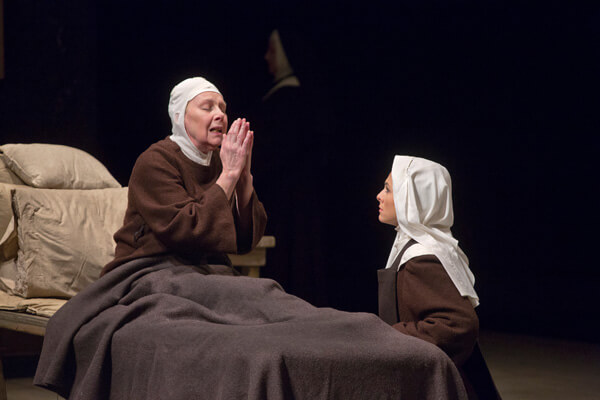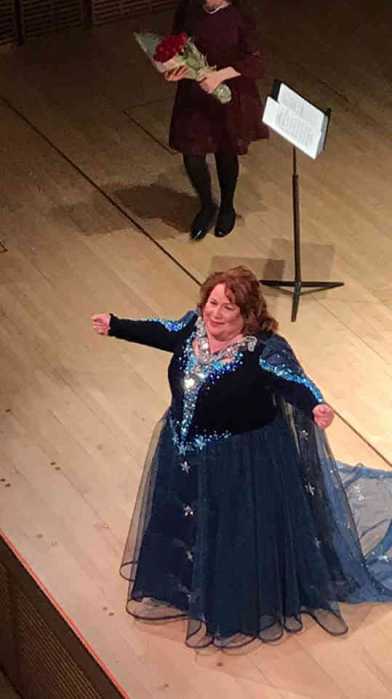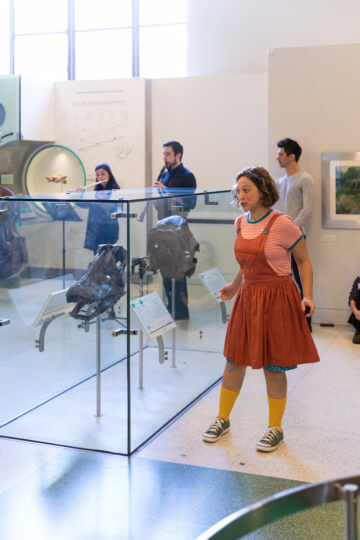Felicity Palmer and Isabel Leonard in Poulenc's “Dialogues des Carmélites.” | KEN HOWARD/ METROPOLITAN OPERA
BY DAVID SHENGOLD | May 6 saw the last performance — for the season, some rumors said the last ever — of the Met’s Machine-dominated “Die Walküre.” The Robert Lepage production’s first act seemed less wrong-headed and dismal this time around, perhaps because some details have been brightened and altered. The principals looked less trapped below the surface.
Still, a few striking images across the evening did not redeem banal moments like poor Sieglinde — Martina Serafin, an excellent, specific actress with an attractive if not technically flawless soprano — scraping the dinner dishes. The second act finale could scarcely be staged worse in terms of credibility, visual focus, or curtain timing, and the show’s final moments sell out the sublime music for the sake of a grandiose Effect without Point.
Fabio Luisi led a performance perhaps best termed “tidy” — cleanly played, even if some brass strayed, but rarely expansive or involving. Act One fared best, as Serafin gave it warmth and vocal shine, despite a clearly limited top voice, and played well off of both her male co-stars.
Machine “Walküre” may be retired; “Carmélites” a triumph
Simon O’Neill, whose impressive first Met Siegmund came in 2008, proved in good form here. His baritonal tenor may be less intrinsically beautiful than that of Jonas Kaufmann — true of most tenors — but it has more ring and command in this particular role.
Hans-Peter König, rather too Santa Claus-y in presence, had a properly abusive rapport going with Serafin’s Sieglinde, and his fine bass stints neither on verbal nor vocal bite.
Act Two dimmed the possibilities, though Greer Grimsley — if in terms of non-godlike timbre more of a Kurwenal or Telramund — made a strongly-voiced, involving showing in his first Met Wotan, certainly an improvement on Mark Delavan’s patchy singing.
Stephanie Blythe, suffering from a knee injury requiring a cane, still provided quality sound as Fricka, though the diminished ease on top that ruined her fall Azucena was clearly evident, if less important here. Blythe still has many roles in which to shine — and she’d out-sing any Erda the Met has yet offered in this staging.
Deborah Voigt bade goodbye to a part that, sadly, she left too late vocally — there was little but “likeability” and generalized energy to commend in her performance — and never mastered in terms of meaningful phrasing. It’s hard to love a “Walküre” without an incisive, compelling Brünnhilde.
“Dialogues des Carmélites” (May 11) proved pretty much a triumph — a shame only three performances were scheduled. Poulenc’s luminous, cinematic score was very well served by Louis Langrée, who might have been the one who chose to violate the composer’s intentions and present the work not in the language of the audience. While the French scansion is excellent, the fine Joseph Machlis translation the company has usually used pulls the audience in much sooner than the French text. The first scene particularly demands word-by-word attention.
Veteran SFO bass Philip Skinner made his company debut as the Marquis, jumping in very solidly for David Pittsinger, but didn’t prove as good a linguist as Paul Appleby, excellent in a role cut to his measure as the Chevalier.
The object of their stifling concern — Blanche — suited Isabel Leonard in many ways. The recent Tucker Award-winner has youth, beauty, a lovely instrument, a wide range, and good enunciation on her side. Though conscientious, Leonard, however, rarely projects a distinct character beyond her own. The neurasthenic, often selfish Blanche seemed pleasantly self-confident, leaving a bit of a hole in the plot.
The dramatic and linguistic confidence of the two Prioresses anchored the show. Felicity Palmer, at 69, remains astonishing for vocal firmness and character. A great artist, she’s always been superb in French, and her Croissy ruled the stage in a manner increasingly rare. Patricia Racette (an excellent Blanche last time out, in 2002) made a moving, compelling, and good-sounding Lidoine, even if lacking the final radiance at the very top.
Elizabeth Bishop sang well, as ever, and made Mère Marie sympathetic if not the major moral force Mignon Dunn or Judith Forst presented. Bishop is a fully qualified Met-quality mezzo, but one doesn’t remember her timbre as with Dunn, Forst, or the lustrous Florence Quivar.
Erin Morley must be the loveliest-sounding Constance the company has had. She deserves further leads. From among the strong ensemble, Mary Ann McCormick (a finely voiced Mathilde), Richard Bernstein (Second Commissioner), and Patrick Carfizzi (Jailer) stood out for incisive work.
In all, a night when the house truly seemed “The Met”.
New York Festival of Song’s 25th anniversary “song party” May 13 at the Di Menna Center was a feel-good event, if somewhat undermined by a hazy acoustic’d patter mic. But all the singers that guiding divo Steven Blier presented made their words crystal clear. We heard a catalog of titles from top hits to obscure discoveries, sung by a panoply of talent from veteran to established to up-and-coming.
High points for me: Amy Burton’s artistry in Bixio’s “Le chaland qui passe” and Mary Testa’s incomparable pizzazz in “I’m Going to Make You Beautiful.” Andrew Garland confidently knocked out the riotous post-coital scena “He Never Did That Before.” Ricardo Herrera’s jet-black baritone, forthrightly delivering several pieces and Julia Bullock exultantly laying out Billy Taylor’s “I Wish That I Knew How It Feels To Be Free” showed that one can be supremely stylish without affectation.
The NYFOS Comedian Harmonists — five Blier Juilliard protégés, Kyle Bielfield, Mils Mykkanen, Nathan Haller, Philip Stoddard, and Leo Radosavljevic — killed with a brilliant rhumba number, “Mein Onkel Bumba.”
Here’s to NYFOS’ next quarter century!
David Shengold (shengold@yahoo.com) writes about opera for many venues.





































